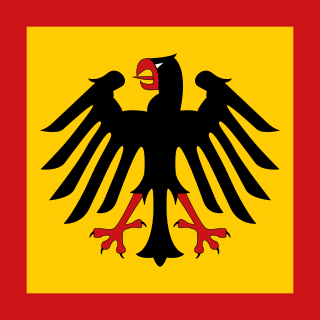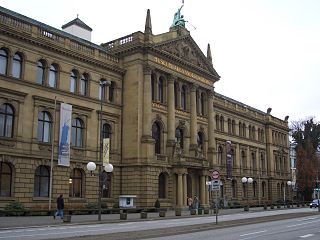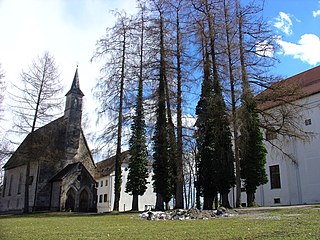
The Bundestag is the German federal parliament. It is the only federal representative body that is directly elected by the German people, comparable to the House of Commons of the United Kingdom. The Bundestag was established by Title III of the Basic Law for the Federal Republic of Germany in 1949 as one of the legislative bodies of Germany and thus it is the historical successor to the earlier Reichstag.

Germany is a democratic and federal parliamentary republic, where federal legislative power is vested in the Bundestag and the Bundesrat.

The president of Germany, officially titled the Federal President of the Federal Republic of Germany, is the head of state of Germany.

The Basic Law for the Federal Republic of Germany is the constitution of the Federal Republic of Germany.
The constructive vote of no confidence is a variation on the motion of no confidence that allows a parliament to withdraw confidence from a head of government only if there is a positive majority for a prospective successor. The principle is intended to ensure governments' stability by making sure that a replacement has enough parliamentary support to govern.

A commander in chief or supreme commander is the person who exercises supreme command and control over an armed force or a military branch. As a technical term, it refers to military competencies that reside in a country's executive leadership, a head of state, head of government, or other designated government official.

The Ecological Democratic Party is a conservative and ecologist minor party in Germany. The ÖDP was founded in 1982.

The Parlamentarischer Rat was the West German constituent assembly in Bonn that drafted and adopted the constitution of West Germany, the Basic Law for the Federal Republic of Germany, promulgated on 23 May 1949.

The chancellor of Germany, officially the federal chancellor of the Federal Republic of Germany, is the head of the federal government of Germany, and the commander in chief of the German Armed Forces during wartime. The chancellor is the chief executive of the Federal Cabinet and heads the executive branch. The chancellor is elected by the Bundestag on the proposal of the federal president and without debate.

Helene Weber was a German politician and was known as a women's rights activist. In the Weimar Republic she rose to prominence in the Catholic Centre Party. In 1945 she was among the founders of the Christian Democratic Union (CDU). In 1948 she was a co-founder of the CDU Women's Task Force, a precursor of the party's Women's Union, which she chaired from 1951 to 1958. Weber is one of four women who, alongside 61 men, drafted Germany's constitution, the Basic Law, in 1948-49. After initial hesitation, she closed ranks with the women delegates of the Social Democratic Party to successfully fight for the inclusion of the sentence "Men and women shall have equal rights" in Article 3 of the Basic Law. She is often cited for her anti-war statement: "The entirely male-run state is the ruin of nations".

The Constitutional Convention at Herrenchiemsee was a meeting of constitutional experts nominated by the minister-presidents of the Western States of Germany, held in August 1948 at former Herrenchiemsee Abbey in Bavaria. It was part of the process of drafting and adopting the current German constitution, the Basic Law (Grundgesetz). The draft document prepared by the Herrenchiemsee convention served as a starting point for the deliberations of the Parlamentarischer Rat in Bonn during 1948 and 1949.
The state of defence is the constitutional state of emergency in Germany if the country is "under attack by armed force or imminently threatened with such an attack". Established by a constitutional amendment in 1968 during the Cold War, this state of emergency gives the Federal Government extraordinary powers in wartime. It is laid down in Title Xa of the German Constitution. As of present, Germany has never been in the state of defence.

The Federal Constitutional Court is the supreme constitutional court for the Federal Republic of Germany, established by the constitution or Basic Law of Germany. Since its inception with the beginning of the post-World War II republic, the court has been located in the city of Karlsruhe, which is also the seat of the Federal Court of Justice.
The Joint Committee is, together with the Federal Convention, one of two non–steady constitutional bodies in the political and federal institutional system of the Federal Republic of Germany. It is designed as an emergency parliament in the case of a State of Defence. It consists of 48 members of which two thirds are members of the Bundestag and one third are members of the Bundesrat, the latter representing the governments of the states of Germany (Länder). It was established in 1968 by an amendment of the Basic Law. Ever since then, the Bundestag and the Bundesrat have elected members to serve on the committee. However, since a state of defence has never been declared, the Joint Committee has never convened as of 2023.

The Compulsory Border Guard Service was enacted by the German parliament in the Federal Border Protection Act of 18 August 1972, based on Article 12a of the German Constitution. The remaining provisions of the Federal Border Protection Act were repealed in 1994. However, compulsory border guard service has not been enforced since 1973. Anyone who serves or served in the Federal Border Guard can no longer be assigned to the military service in the German Federal Armed Forces. In 2005 the border guard was renamed the Bundespolizei (BPOL) and any mandatory service would be performed there.

Benjamin Strasser is a German lawyer and politician of the Free Democratic Party (FDP) who has been serving as a member of the Bundestag from the state of Baden-Württemberg since 2017, representing the Ravensburg district.

Ria Schröder is a German politician of the Free Democratic Party (FDP) who has been a member of the Bundestag since 2021.

Macit Karaahmetoğlu is a German lawyer and politician of the Social Democratic Party (SPD) who has been a Member of the German Bundestag since 2021.

Inner German relations, also known as the FRG-GDR relations, East Germany-West Germanyrelations or German-German relations, were the political, diplomatic, economic, cultural and personal contacts between the Federal Republic of Germany and the German Democratic Republic, at the period of the West-East division in German history from the founding of East Germany on 7 October 1949 to Germany's reunification on 3 October 1990.
Paragraph 219a was a German penal law in the Strafgesetzbuch that prohibited medical professionals from mentioning that they provide abortions. It is out of force since 19 July 2022.















